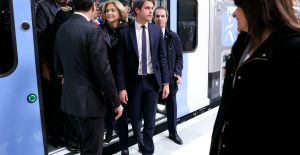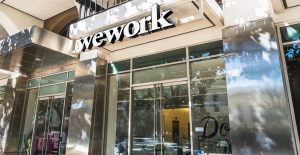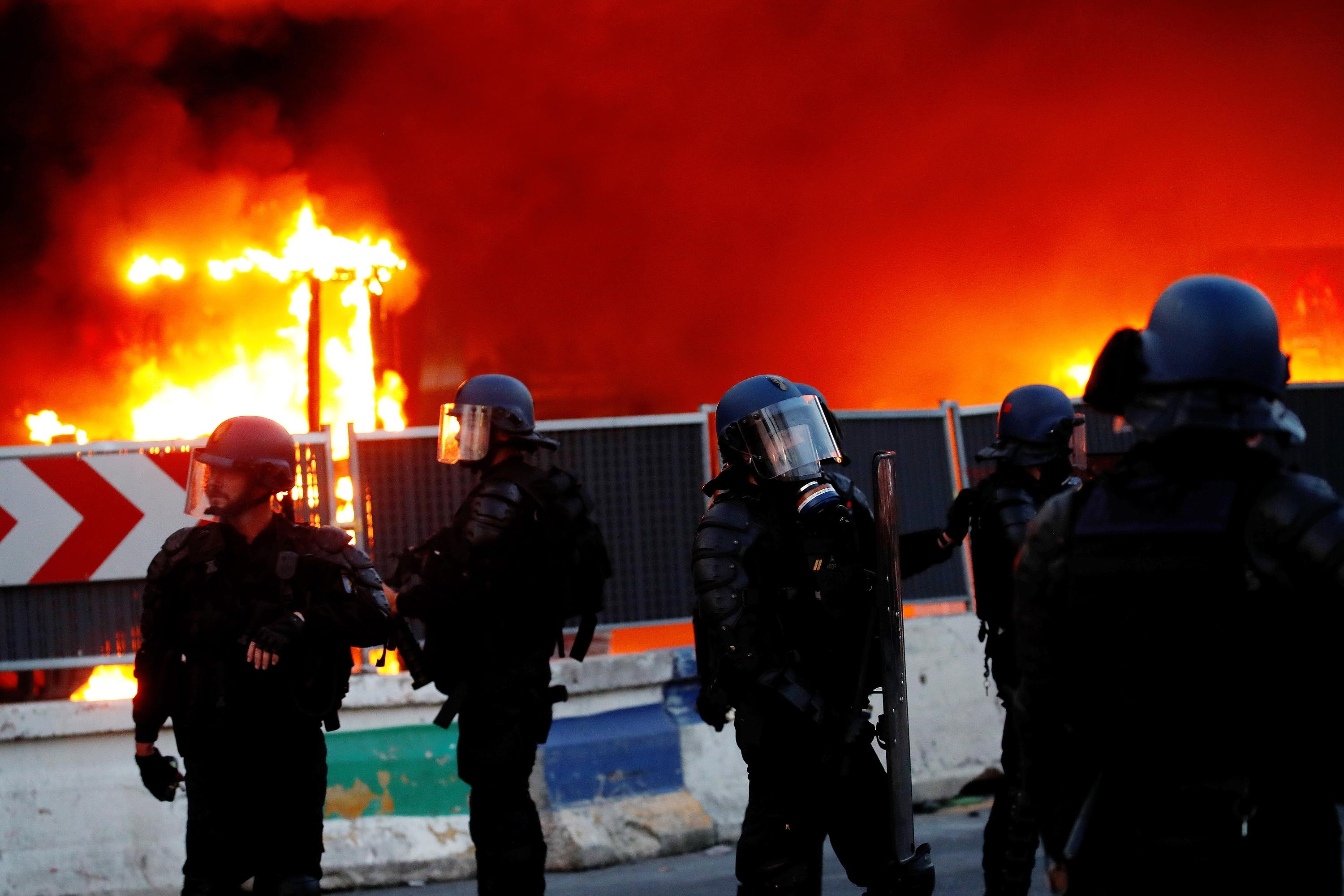Lörrach, Baden-Württemberg, a town of 50,000 people at the extreme southwestern tip of Germany. This place is rarely mentioned in national media. By the end of last week, a letter from the municipal housing association “Wohnbau” suddenly made waves: Forty tenants from Wölblinstraße 21 to 29 received an invitation to the “Wohnbau” tenants’ meeting, which was quite a challenge.
"As you know, Germany has seen a significant influx of refugees from Ukraine and other regions of the world," it said. "For you, this means that we will shortly be terminating the tenancy agreed with you." The tenants will be offered "alternative, suitable living space" and the tenants will be supported in moving. In addition to the tenants' meeting on February 27, each tenant would have the opportunity for a one-on-one meeting.
This non-public tenants' meeting has now been postponed indefinitely - because of the "heated mood", as Mayor Jörg Lutz (independent) explained today at the media conference of the city and the "housing" in the town hall. Lutz blames both high-reach users of social networks and journalists for the fact that the letter was taken out of its context. The case of the tenants in Lörrach, according to the mayor, "doesn't really cause a scandal", it represents the discussion about immigration, which is "not or not sufficiently" conducted in this country and which is therefore focused on Lörrach "like in a burning glass". have.
“Wohnbau” managing director Thomas Nostedt explained that the original plan was to demolish the residential building on Wölblinstrasse this year or next. But in view of the “exploded” construction prices last year, the decision was made to use the building as refugee accommodation until around 2028. One would invest a hundred thousand euros in the building for this.
The residential complex in the west of the city has a long history. It was originally built to accommodate displaced persons from the Second World War, explains Hubert Bernnat (73), parliamentary group leader of the SPD in Lörrach, to WELT. "Sooner or later, 'Wohnbau' would have had to give notice to the tenants anyway," says Bernnat, who, as a member of the main municipal committee, helped to decide on the eviction of the tenants in Wölblinstrasse in a non-public meeting. The retired headmaster, who has been a member of the Lörrach municipal council for 20 years, explains: "The houses on Wölblinstraße are 70 years old and have reached the end of their life cycle."
According to Bernnat, the current tenants will be moving out of the home later this year. The city will help them financially and, if necessary, organizationally. If necessary, they will also be able to provide them with new, barrier-free apartments. He can still understand their concerns, he says: they have "every right to be angry."
Lörrach is right on the Swiss border; In 2021, around 22,000 Lörrach commuters earned their money there. Due to the relatively high income of commuters and the increasing demand for living space, real estate prices have climbed "to the level of a big city", says Bernnat, so that "even the 'housing' is reaching its limits".
In order to be able to offer refugees accommodation, 40 tenants from Lörrach are to vacate their apartments. "The city has obviously reached the limits of its possibilities," says former member of the Bundestag Wolfgang Bosbach (CDU).
Source: WORLD / Wolfgang Bosbach
Rents at city level, that means in Lörrach: around 14 euros per square meter. Mayor Lutz explains that the average price per square meter for tenants in “Wohnbau” apartments, on the other hand, is only 7.07 euros. Accordingly, the apartments are particularly sought after by low-income earners from the area.
According to Lutz, both war refugees from the Ukraine and migrants would find accommodation in the apartments on Wölblinstrasse. He did not give exact numbers: "We do not differentiate here. It's about people who come to us." Currently, 22 of the 30 apartments in Wölblinstraße 21-29 are single-person households, added "Wohnbau" Managing Director Nostedt.
"The federal government must help the municipalities," said Lutz in conclusion. Either "by reducing immigration" or by the federal government strengthening "social work and housing". Lutz pointed out that “Wohnbau” has always had a very good reputation in the city. But after the letter to the tenants, which became public, the "Wohnbau" had received hundreds of threatening letters and thousands of threatening phone calls from all over Germany.
40 tenants in Lörrach in Baden-Württemberg are to vacate their apartments because this space is needed for refugees. "The Minister of the Interior leaves our local authorities out in the rain," says CDU politician Philipp Amthor in the WELT interview.
Source: WORLD
In an interview with WELT, SPD parliamentary group leader Bernnat also blames federal and state politics for the heated mood around Wölblinstrasse. The local politician complains that neither of them are meeting their obligations to the local authorities. For example, the federal government has largely withdrawn from subsidies for social housing in the municipalities: “So we are left with the costs.” Lörrach “housing construction” has to go into debt and the municipality lacks the money to hire additional staff to accommodate the refugees pay. Therefore, the situation around Wölblinstraße is an example of how the failed federal and state policies are causing a "splitting of society".
Around 1,200 refugees are currently living in the so-called “connection accommodation” in the city of Lörrach – like the one planned in Wölblinstraße. According to the city administration, 501 people live in city apartments. According to the city administration, the capacity of the city's follow-up accommodation will be exhausted in the course of the year. Last year the city took in 638 refugees - forty-six more than the official allotment quota.
Elke Zimmermann-Fiscella also knows that the situation in Lörrach is tense. She is head of social affairs for the district of Lörrach, which includes 35 other locations in addition to the city. As head of the Department for Social Affairs and Youth, she is responsible for the needs of around 230,000 people.
In 2022, 2,551 Ukrainians and 187 asylum seekers from other third countries were assigned to the follow-up accommodations of the cities and municipalities, Zimmermann-Fiscella explains in an interview with WELT. The procedure: The refugees are first assigned to community accommodation by the state. War refugees from Ukraine usually stay there for up to six months, asylum seekers up to two years. The district then assigns them to the connecting accommodations of the cities and municipalities; he calculates the quota based on the number of inhabitants. They would usually stay there for two years before they could move into their own rental apartment.
There are currently 1,100 refugees in the community shelters of the temporary accommodation. 411 of them come from Ukraine, but countries from the Middle East and North Africa are also represented: 113 refugees come from Syria, 93 from Afghanistan, 87 from Turkey and 23 from Tunisia. According to the current status, 1750 refugees will be assigned to follow-up accommodation in the district in 2023.
"For the fact that we accommodated so many people last year, things are going very well so far," says the head of the social affairs department. They rely “on good social care for the refugees and on functioning volunteer work.” The fact that it has not been necessary to use sports halls to accommodate refugees is something “we attach great importance to here in the district”.
So that the cities and municipalities are prepared in good time to create living space for refugees in follow-up accommodation, they would be informed in advance of the expected number: "We rely very heavily on communication," says Zimmermann-Fiscella. "In the run-up to the opening of new community accommodations, we always organize an event where citizens can ask their questions and where they can get information." If a community is not receptive, "then we try to find other solutions - if in doubt, individual ones. We have to work them out in dialogue with the cities and communities,” she emphasizes.
According to Margarete Kurfeß, however, there was a lack of proper communication between “Wohnbau”, the city and the citizens. In a press release from her parliamentary group, the parliamentary group leader of the Greens in Lörrach criticizes that Wohnbau “should have first sought and explored the conversation and explored where, after the facts had been presented, offers of relocation met with interest or where there was a risk of problems and hardship due to individual life situations.”
"Wohnbau" and the city of Lörrach should "not only do everything in their power to clarify the facts in this situation, but also to approach the tenants". "Constructive and satisfactory solutions" must be found on all sides, according to the local politician.

 What is chloropicrin, the chemical agent that Washington accuses Moscow of using in Ukraine?
What is chloropicrin, the chemical agent that Washington accuses Moscow of using in Ukraine? Poland, big winner of European enlargement
Poland, big winner of European enlargement In Israel, step-by-step negotiations for a ceasefire in the Gaza Strip
In Israel, step-by-step negotiations for a ceasefire in the Gaza Strip BBVA ADRs fall almost 2% on Wall Street
BBVA ADRs fall almost 2% on Wall Street Children born thanks to PMA do not have more cancers than others
Children born thanks to PMA do not have more cancers than others Breast cancer: less than one in two French women follow screening recommendations
Breast cancer: less than one in two French women follow screening recommendations “Dazzling” symptoms, 5,000 deaths per year, non-existent vaccine... What is Lassa fever, a case of which has been identified in Île-de-France?
“Dazzling” symptoms, 5,000 deaths per year, non-existent vaccine... What is Lassa fever, a case of which has been identified in Île-de-France? Sánchez cancels his agenda and considers resigning: "I need to stop and reflect"
Sánchez cancels his agenda and considers resigning: "I need to stop and reflect" “Amazon product tester”: the gendarmerie warns of this new kind of scam
“Amazon product tester”: the gendarmerie warns of this new kind of scam “Unjustified allegations”, “promotion of illicit products”… Half of the influencers controlled in 2023 caught by fraud repression
“Unjustified allegations”, “promotion of illicit products”… Half of the influencers controlled in 2023 caught by fraud repression Extension of the RER E: Gabriel Attal welcomes a “popular” ecology project
Extension of the RER E: Gabriel Attal welcomes a “popular” ecology project WeWork will close 8 of its 20 shared offices in France
WeWork will close 8 of its 20 shared offices in France “We were robbed of this dignity”: Paul Auster’s wife denounces the betrayal of a family friend
“We were robbed of this dignity”: Paul Auster’s wife denounces the betrayal of a family friend A masterclass for parents to fill in their gaps before Taylor Swift concerts
A masterclass for parents to fill in their gaps before Taylor Swift concerts Jean Reno publishes his first novel Emma on May 16
Jean Reno publishes his first novel Emma on May 16 Cannes Film Festival: Meryl Streep awarded an honorary Palme d’Or
Cannes Film Festival: Meryl Streep awarded an honorary Palme d’Or Omoda 7, another Chinese car that could be manufactured in Spain
Omoda 7, another Chinese car that could be manufactured in Spain BYD chooses CA Auto Bank as financial partner in Spain
BYD chooses CA Auto Bank as financial partner in Spain Tesla and Baidu sign key agreement to boost development of autonomous driving
Tesla and Baidu sign key agreement to boost development of autonomous driving Skoda Kodiaq 2024: a 'beast' plug-in hybrid SUV
Skoda Kodiaq 2024: a 'beast' plug-in hybrid SUV The home mortgage firm rises 3.8% in February and the average interest moderates to 3.33%
The home mortgage firm rises 3.8% in February and the average interest moderates to 3.33% This is how housing prices have changed in Spain in the last decade
This is how housing prices have changed in Spain in the last decade The home mortgage firm drops 10% in January and interest soars to 3.46%
The home mortgage firm drops 10% in January and interest soars to 3.46% The jewel of the Rocío de Nagüeles urbanization: a dream villa in Marbella
The jewel of the Rocío de Nagüeles urbanization: a dream villa in Marbella Europeans: a senior official on the National Rally list
Europeans: a senior official on the National Rally list Blockade of Sciences Po: the right denounces a “drift”, the government charges the rebels
Blockade of Sciences Po: the right denounces a “drift”, the government charges the rebels Even on a mission for NATO, the Charles-de-Gaulle remains under French control, Lecornu responds to Mélenchon
Even on a mission for NATO, the Charles-de-Gaulle remains under French control, Lecornu responds to Mélenchon “Deadly Europe”, “economic decline”, immigration… What to remember from Emmanuel Macron’s speech at the Sorbonne
“Deadly Europe”, “economic decline”, immigration… What to remember from Emmanuel Macron’s speech at the Sorbonne These French cities that will boycott the World Cup in Qatar
These French cities that will boycott the World Cup in Qatar Champions Cup: Toulouse with Flament and Kinghorn against Harlequins, Ramos replacing
Champions Cup: Toulouse with Flament and Kinghorn against Harlequins, Ramos replacing Tennis: still injured in the arm, Alcaraz withdraws from the Masters 1000 in Rome
Tennis: still injured in the arm, Alcaraz withdraws from the Masters 1000 in Rome Sailing: “Like a house that threatens to collapse”, Clarisse Crémer exhausted and in tears aboard her damaged boat
Sailing: “Like a house that threatens to collapse”, Clarisse Crémer exhausted and in tears aboard her damaged boat NBA: Patrick Beverley loses his temper and throws balls at Pacers fans
NBA: Patrick Beverley loses his temper and throws balls at Pacers fans


















